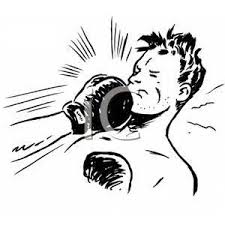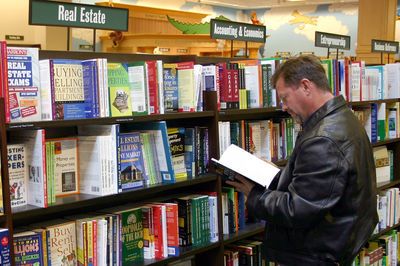Common wisdom in the writing world claims the opening line sells your book and the closing line sells your next book. Whether that wisdom is accurate or not, most writers seem to agree the first line of a novel is oh, so very important. It can make or break your novel.
Think about it. A reader wanders through the bookstore (or in this electronically-oriented world, wanders through a website), spots a catchy cover, and picks up the book. Or, perhaps, this reader goes directly to the shelves holding the desired genre and studies the titles and author’s names
That’s when you have to hit ’em right between the eyes! Knock ’em dead! [Figuratively speaking. You don't want to damage a reader's eyes]

It better be good!
If an author doesn’t make the effort to sculpt the words of the first line into a masterpiece, what level of attention has he/she taken with the key moments in the novel when interpretative pressure is at its peak, when capturing a complete fictional world is at its most pressing?
As one writer put it, “Screw up the opening, screw up the book.”
WHAT TO DO AND WHAT NOT TO DO
So, how does a writer come up with the perfect first line? I wish I knew. If there was a failsafe formula, someone would be out there selling it and making a bundle.
Instead, there are a plethora of opinions and guidelines—things an author should and should not do—and those vary to some extent. However, they all agree it should be intriguing and capture the reader’s interest. It’s the how of it they disagree on.
Well, maybe not even the how, but more what is interesting and compels the reader to go on.

● Be intriguing,
● Hint at things to come,
● Be compelling,
● Set the tone and flavor of the book, show what kind of book it is,
● Incorporate the mood or theme of the story.
● Establish an intriguing question that makes the reader want to find out more.
The First Line Should Not Be:
● Bland or trite.
● An overused references to the elements or time of the year.
If you choose to write about the weather, be careful. You run the risk of inviting comparisons to “It was a dark and stormy night,” (Edward Bulwer-Lytton’s classic first line from his 1830 novel, Paul Clifford) and your book won’t stand a chance.
SUZANNAH SAYS
Here’s another version from Suzannah over at Write it Sideways, who lists what to do and not do in your opening lines.

● Dialogue
Suzannah feels dialogue is all right somewhere on the first or second page, but not in the first line. She feels the reader won’t know who’s speaking or care.
● Excessive description
Some description is good, but not when it’s long winded. Skip the purple prose and opt for something more powerful.
● Irrelevant information
The first few lines of your story are crucial, so give your reader only important information.
● Introduction of too many characters
I’m not sure how you introduce too many characters in one line, but I supposed it’s possible.
In this case, it seems the comment applies to the first paragraph or first page. Suzannah doesn’t like to be bombarded with the names of too many characters at once. How is the reader supposed to keep them straight?

● Make your readers wonder
Put a question in your readers’ minds. What do those first lines mean? What’s going to happen? Intrigue with unanswered questions and they’ll keep reading.
● Begin at a pivotal moment
By starting at an important moment in the story, the reader is more likely to want to continue so he or she can discover what will happen next.
The promise of reading more about a character you find intriguing will, no doubt, draw you into a story’s narrative. Most often, this is one of the main characters in the book.
● Start with an unusual situation
Show us characters in unusual circumstances, and we’ll definitely be sticking around to see what it’s all about.
● Begin with a compelling narrative voice
Open your story with the voice of a narrator we can instantly identify with, or one that relates things in a fresh way.
BEST FIRST LINES OF NOVELS
It’s always interesting to compare advice to actual first lines. Below, I’ve listed a sampling of the first lines I’ve collected over the years; some good, some not-so-good. And sometimes it takes more than just one line. There is quite a variety, and several are first paragraphs rather than first lines. Personally, for me a powerful first line is the best.
You’ll note quite a few were penned by mystery writer Dick Francis who, in my opinion, is one of the Masters of the First Line.
At the end, I’ve provided a link to the American Book Review List of the One Hundred Best First Lines in American literature. I can’t say that a lot of those resonate with me. Quite a few break one or two of Suzannah’s rules for what not to do. Others, while they are first lines from great works of literature, aren’t exactly catchy as stand-alone opening lines.
I believe the first lines considered good and great may vary depending both time and location. For example, in my opinion, British readers are generally much more tolerant of lengthy sentences and difficult words than American readers. Although I haven’t really studied this topic in detail or done extensive research, it seems there are difference in “best first lines” in books written in earlier centuries (such as Daniel Defoe’s Robinson Crusoe written in 1719) and more recent works, as well as difference between literary and popular fiction.
Examples
Please note that the quote marks at the beginning and end of the first line or paragraph are there to indicate this sentence(s) is a quote from the book, not dialogue. A single quote is used for dialogue within the quote from the book.
"I have often recalled the morning when the first of the anonymous letters came."
The Moving Finger by Agatha Christie
"Three days before her death, my mother told me—they weren’t her last words but they were pretty close—that my brother was still alive." Gone For Good by Harlan Coben
"A man called Berg, who changed his name to Greb, came to a seaside town intending to kill his father." Berg by Ann Quin
"Once upon a time, there was a woman who discovered she had turned into the wrong person." Back When We Were Grownups by Anne Tyler (2001)
"Living in Trenton in July is like living inside a big pizza oven. Hot, airless, aromatic."
Four To Score by Janet Evanovich
"The way I see it, life is a jelly doughnut. You don’t really know what it’s about until you bit into it. And then, just when you decide it’s good, you drop a big glob of jelly on your best T-shirt." Ten Big Ones by Janet Evanovich (2004)
"You get justice in the next world, in this world you have the law."
A Frolic Of His Own by William Gaddis (1994)
"I sat at Michael’s desk, buried under a mountain of third-class mail. October 7, 1983. The second plea from Newsweek: YOU HAVE NOT RENEWED. PLEASE TELL US WHY. I answered for him: Because I died. Then I signed his name."
Death In A Sunny Climate by Diane Shalet (1994)
"Murderers do not usually give their victim notice."
A Certain Justice by P. D. James (1997)
"I don’t mean to bitch, but in the future I intend to hesitate before I do a favor for a friend of a friend. Never have I taken on such a load of grief."
“L” Is For Lawless by Sue Grafton (1995)
"James Lassiter was forty years old, a well-built, ruggedly handsome man in the prime of his life, in the best of health. In an hour he’d be dead."
The Reef by Nora Roberts (1998)
“You’re a spoiled, bad-tempered bastard,” my sister said, and jolted me into a course I nearly died of." Flying Finish by Dick Francis
"The Earl of October drove into my life in a pale-blue Holden which had seen better days."
For Kicks by Dick Francis
"I stood on the outside of disaster, looking in." In The Frame by Dick Francis
"I intensely disliked my father’s fifth wife, but not to the point of murder."
Hot Money by Dick Francis
"I inherited my brother’s life. Inherited his desk, his business, his gadgets, his enemies, his horses and his mistress. I inherited by brother’s life, and it nearly killed me."
Straight by Dick Francis
"Gordon Michaels stood in the fountain with all his clothes on."
Banker by Dick Francis
]
"The trouble with reality was that it was so dammed real."
The Spiral Path by Mary Jo Putney (2002)
"The last time I saw Mason City I went up there in that big black Cadillac with the Boss and the gang, and we burned up that new concrete slab, and it was a long time ago—nearly three years ago, for is it now into 1939. But it seems like forever,"
All The King’s Men by Robert Penn Warren
"Dusk seemed to hold its breath as the gunshot’s echo reverberated against the canyon’s rocky walls." I’ll Remember You by Barbara Ankrum (1999)
"Carmela nervously clutched the burlap bag that held her other dress, some water, and the small package of food she had been able to save for the trip north, across the border."
Open Season by Linda Howard (2001)
"They used to hang men at Four Turnings in the old days. Not anymore, though."
My Cousin Rachael by Daphne DuMaurier (1952) Note: This novel begins and ends with the same line.
"The room was dark. He sat in the chair, his arms hugging his legs. It was happening again. Charley wouldn’t stay locked in the secret place. Charley insisted on thinking about Erin. Only two more, Charley whispered. Then I’ll stop."
Loves Music, Loves To Dance by Mary Higgins Clark (1991)
"She’d gotten through the entire evening without killing anyone. Lieutenant Eve Dallas, cop to the bone, figured the restraint showed enormous strength of character."
Visions In Death by J. D. Robb (Nora Roberts) (2004)
"Since Maria had decided to die, her cat would have to fend for itself. She’d already cared for it far beyond the point where keeping a pet made any sense. Rats and mice had long since been trapped and eaten by the villagers."
Child 44 by Tom Rob Smith (2008)
"It seems there should have been some warning, but I felt none. Events were already in motion." Mutant Message Down Under by Marlo Morgan (1991)
"Quiet Town wasn’t."
A Western, unnamed (I think this may be from a movie, but I like it.)
"It was a bright cold day and the clocks were striking thirteen."
1984 by George Orwell
Congratulations! If you are reading this, you got through all those first lines and paragraphs. Kudos! To get the most out of the exercise, compare the ones you really like and the ones you really don't like to Suzannah's do's and don'ts.
RESOURCES
Articles on First Lines
http://www.blog.ljboldyrev.com/2010/06/importance-of-first-line.html
http://crofsblogs.typepad.com/fiction/2006/04/that_allimporta.html
http://kaitnolan.com/2007/08/30/the-importance-of-opening-lines/
http://www.guardian.co.uk/books/booksblog/2007/may/10/openingsentencesblog
http://alternativereel.com/includes/top-ten/display_review.php?id=00117
http://www.bluecubiclepress.com/store.htm
First Line Literary Journal
http://www.thefirstline.com/
How to write the first chapter of a novel
http://www.ehow.com/how_4679283_write-first-chapter-novel.html
http://murderby4.blogspot.com/2009/11/your-first-line-hook-that-gets-your.html
http://www.bellaonline.com/articles/art48800.asp
http://www.infoplease.com/ipea/A0934311.html
http://www.pantagraph.com/news/article_a125216a-649f-5414-88b5-76a688ea3b6a.html




 RSS Feed
RSS Feed